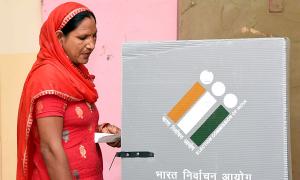Daily meals, tea, snacks were always considered trivia -- until you left home.
 The things that we always took for granted are now a headache -- how long can you eat out, survive on fast food and noodles?
The things that we always took for granted are now a headache -- how long can you eat out, survive on fast food and noodles?
What about your health?
What about watching your weight?
Independence comes with a lot of responsibilities and one of them is managing your grocery shopping!
Remember mom's words? "Jab akele rahoge tab aate-dal ka bhav pata chalega."
When I came to Mumbai three-and-a-half years ago, I did not even know how to make tea. Burnt chapattis were my speciality.
Today, my roomies relish the food I prepare. Tips from well-wishers and the experience of living alone have taught me to manage a home on my own.
Pinky Gogri, 30, a Surat-based fashion designer and homemaker, has been running her own home for 10 years now. Her hobby is to share tips with single people and young couples on how to manage a home. She offers us some of her mantras.
i. Make a grocery checklist
Before shopping, make a list of the basic items you need -- pulses, spices, oil, ghee, juices, dry fruits, ready-to-make soups, etc. Try to ensure you have stocked up all the contents on this list.
My friend Tamana Nangia, who works as an assistant manager, guest relations, for a five star hotel lists down her monthly requirements for groceries, pulses, detergents and spices before setting out to shop. She says it helps her remember and prioritise what to buy.
Here is a basic list of what you must stock up on at all times:
~ Take your pick from pulses like tur dal (yellow), moong dal (yellow and green), whole moong dal (green), masoor dal (pink), whole masoor dal (black) and udal dal (white and black), peas or vatana (white and green), chickpeas or chole/ kabuli chana (white), black and green chana is also available, kidney beans or rajma (white, red, black), white beans or chauli (white and pink) and motth (brown moong dal) of about 250 to 500 grams each.
~ Spices like turmeric, red chilli powder, mustard seeds, cumin seeds or jeera and garam masala.
~ Ghee or clarified butter
~ 1 litre cooking oil. Choose from soyabean, sunflower or groundnut oil. Consult our guide to healthy cooking oils.
~ 3-5 kilos wheat flour
~ 2 kilos rice. Choose from basmati or regular rice, depending on your budget.
~ Ready-to-cook parathas, chapattis and sabji are available, which only need to be heated. It's okay to eat these once in a while but it is advisable to eat freshly cooked meals more often.
~ 2 kilos washing powder
~ 2 bars utensil washing detergent
~ 6 eggs (unless you are vegetarian)
~ Always stock up on potatoes, onions, tomatoes. These can be used to enhance any dish, anytime.
ii. Window-shop and ask for help
Browse around and take note of the varieties and brands available before buying. You'd be surprised to know that at least 20 dals exist!
Make a mental note of what works for you every time you experiment with a new product.
If you feel confused, approach women buying stuff for their households and ask for help. Usually, they are more than happy to share information. My ex-roommate Nisha would never approach a stranger. But if I were in doubt, I would catch hold of the next lady and ask her. What are you going to lose?
Even my little brother Parag, 18, who is shy and has recently started living in a hostel asks for help all the time.
iii. Economy versus convenience
When one is living alone convenience plays a major role in shopping habits, as does economy. You need to buy stuff that is good in quality as well as economical.
Budget your expenses. Figure out how much you can afford to spend on groceries, vegetables, etc. Compare how much more would you spend if you bought from a departmental store vis-à-vis from the local market.
"I prefer to buy from a departmental store as the prices there are regulated and I know I won't be cheated. Also, I don't require to buy an entire cauliflower when I cook for just myself, so buying cut vegetables that are available in departmental stores is more convenient for me," says 23-year-old Uttam Chopra, a new media advertising executive, who has been living on his own since a year.
Also look out for attractive discounts and offers in departmental stores. Things like washing powder and monthly groceries like dals, pulses and spices are best bought at departmental stores.
iv. Get cheated initially
When shopping for the first few times at your local market, the shopkeepers will figure out you are new. But it's okay to be cheated on rates initially.
When I first went shopping for vegetables in the local market, I bought potatoes for Rs 20 a kilo while the market rate was Rs 14 to Rs 15 a kilo. For a week's vegetable shopping, we were paying about Rs 30 to Rs 40 more than the market rates.
Then I enquired for rates in another area and realised I was getting conned. In a about a month's time, I became savvy and got cheated less.
Though prices offered at stores for vegetables and fruits are cheaper than the local market, it is best to buy them fresh from the local market. It is a healthier option. Eventually one learns the art of buying vegetables at a good price.
Buying stuff at the end of the day is a good idea. Since vegetable vendors do not want to take their wares back home, they sell it cheaper at the end of the day.
v. Buy for a short period
Since you live alone or with one or two housemates, it is advisable to store grocery only for a month.
Vegetables should not be bought for more than a week.
I buy pulses, dals and spices on a monthly basis and fruits and vegetables once a week.
vi. Storing food
When Nisha and I set up our kitchen for the first time in Mumbai, we bought containers to store our grocery. Within a fortnight we had to throw away the dals, which had started smelling foul. We were almost determined not to cook.
Pinky came to our rescue. She suggested that, since Mumbai is humid, we needed to invest in airtight containers.
We chipped in for new containers and, since then, all our stuff is safe. If you are based near water resources like an ocean, the climate will be humid, or if the weather is chilly or rainy, airtight containers are recommended. If the weather is dry, regular containers should do.
One can also stock up some ready-to-make vegetables, dals, parathas, noodles, soups, etc, for a lazy day. Though they are easy to cook, the option is healthy only if used once in a while.
vii. When is doubt, ask mom
Cooking for oneself can prove to be a task. Initially, I was a sucker for fried potato chips, butter, jam and cheese, but my health went for a toss with an overdose of these. I started eating a lot of my meals at work, which was also not too healthy.
Finally, I called up my mom and took down a few simple, healthy recipes using vegetables that were easy to cook. I also logged on to recipe Web sites and picked up a few affordable help books on cooking.
My favourites Web sites:
- Tarla Dalal's web site
- Sanjeev Kapoor's web site
- Rasoionline.com
- South Indian recipes
- Poonam Dhillon's recipes
- Bawarchi.com
Pick up books and CDs by veteran chefs like Sanjeev Kapoor and Tarla Dalal on different types of cuisines.
Keep an eye out for books on low fat cooking, 10-minute breakfast recipes, etc, when you visit a bookstore or a book sale.
vii. Experiments in the kitchen
Along the way I experimented too. Here is one of my own recipes using potato and ladyfingers. This serving is enough for two people.
~Ingredients
4 medium sized potatoes
250 gm ladyfingers
1 tablespoon oil
¼ tablespoon each turmeric powder, mustard seeds, red chilli powder and garam masala
Salt to taste
~Method
Boil the potatoes in a cooker for five minutes.
After they cool down, peel and cut into small pieces.
Put oil in cooking vessel and add mustard seeds, red chilli powder and potato pieces.
Heat till they turn brown.
Add turmeric powder, garam masala and salt to taste.
Then, add chopped ladyfingers to the mixture.
Close the vessel and let the vegetable cook on a low flame for 15 to 20 minutes.
Serve hot with bread or rice.
Now, you are all set. Happy cooking!
Do you currently live alone? And have you perfected the art of grocery management? Do you have any quick cooking recipes? Share your tips.
Don't forget to mention your name, age, location and what you do for a living.
DON'T MISS!
Illustration: Uttam Ghosh








More from rediff